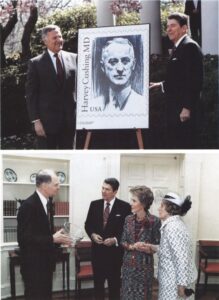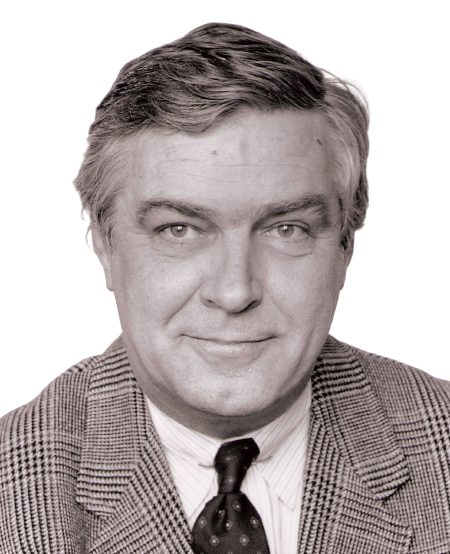Published as Submitted.
In 1975, the American Association of Neurological Surgeons (AANS) and the Congress of Neurological Surgeons (CNS) decided to hire a professional lobbyist in Washington, DC, to represent the specialty’s interest before Congress and federal agencies. Four neurosurgeons — Louis A. Finney, MD; Donald H. Stewart, Jr., MD; Russel H. Patterson, MD; and Charles A. Fager, MD — were tasked with this job and found an experienced former U.S. Senate chief of staff, Charles L. Plante, PhD. In 1976, the AANS and CNS contracted for his service as a part-time professional advocate.
In honor of his 20 years of service as organized neurosurgery’s first Washington representative and the legacy he established (the AANS/CNS Washington Committee and Washington office have been advocating for the specialty for nearly 50 years), the AANS Board of Directors established a lectureship named in his honor. Funded by the Katie O. Orrico, Esq., Neurosurgery Research & Education Foundation Honor Your Mentor Fund, which supports education on health policy, socioeconomics and public and private sector advocacy, the Charles L. Plante Lecture features an individual (neurosurgeon or non-neurosurgeon) who has made an impact on neurosurgical practice and patient care through advocacy and health policy.
Anthony L. Asher, MD, FAANS, has been selected to deliver the inaugural lecture in recognition of his contributions to improving neurosurgical patient care. Through pioneering quality data projects, including the NeuroPoint Alliance and the American Board of Neurological Surgery’s Practice and Outcomes of Surgical Therapies, Dr. Asher recognizes the power of outcomes science to transform data into quality patient care. His efforts will help improve the value of neurosurgical care now and into the future.
A Lasting Legacy — The Benevolent Lobbyist
Charlie was a true renaissance man. He was a gentleman, scholar, mentor, philosopher, advocate and volunteer. He had a strong faith and commitment to the Catholic Church, having contemplated a life in the monastery as a young man. Anchored by this strong moral compass, he was honorable, humble, generous, principled, wise, hard-working, selfless, nonjudgmental, forgiving and loving — bringing these qualities to his work as a lobbyist. Charlie embodied what it means to have integrity as a lobbyist. “Doing what is best for patients will always be the best thing for neurosurgeons,” he often said. He also cautioned, “Never use the word ‘I’ because nothing happens solely because of one person. Positive outcomes are achieved by many people working together.”
Charlie was passionate about public policy and public service, and the entire arc of his career demonstrated this commitment. From 1955-57, Charlie was in the U.S. Army, having volunteered for service. In 1957, he went to Capitol Hill, working for former Senator William “Wild Bill” Langer from North Dakota. He subsequently served as chief of staff for Sens. Thomas J. Dodd (D-Conn.) and Quentin N. Burdick (D-N.D.). During this time, Charlie went to Georgetown University as a full-time night student while at the same time supporting and raising his family. As a Fulbright Scholar, in 1969, he was inspired by President John F. Kennedy and his brother-in-law Robert Sargent Shriver Jr. to join the Peace Corps, traveling halfway across the globe with his family in tow to serve as the group’s regional director in the Philippines.
Charlie was…not a lobbyist who traded in campaign contributions and lavish entertainment; but a lobbyist who traded in information and bringing people from different cultures – medicine and politics – together. He was then, and throughout his career, the best of what a lobbyist should be. Not a corrupter of the system, but an essential liaison between citizens, interest groups and legislators.”
James J. Mongon, MD: Former president of Massachusetts General hospital; staff member of the U.S. Senate Finance Committee; deputy assistant secretary for health, U.S. Department of Health and Human Services and associate director of domestic policy, White House
Following his stint in the Peace Corps, Charlie returned to Washington, DC, and founded his company, CLP Associates — a small boutique lobbying firm that predominantly represented health care clients. During his tenure at the helm of his company, Charlie made a lasting contribution to many Americans suffering from various health ailments.
Charlie’s foundational work in organ transplantation policy was perhaps one of his greatest professional achievements. Hired by the National Kidney Foundation (NKF), Charlie’s efforts contributed to the passage of the Uniform Anatomical Gift Act in 1968. His seminal work was the passage of the first major change to the nascent Medicare entitlement program — the End-Stage Renal Disease (ESRD) program. Signed into law by President Richard M. Nixon, the Social Security Amendments of 1972 expanded Medicare coverage to individuals under 65 with end-stage renal disease who required maintenance dialysis or a kidney transplant. Six years later, in 1978, Charlie successfully advocated for a change in the law, and Medicare coverage was expanded from 12 to 36 months post-transplant. Later, in the Omnibus Budget Reconciliation Act of 1986, his advocacy led to expanded Medicare coverage for immunosuppressive drug therapy for transplants to help prevent organ rejection. Today, these efforts help nearly 800,000 people in the U.S. living with ESRD.
Charlie was passionate about scientific discovery and medical research, dedicating much of his professional life to increase funding for the National Institutes of Health. He made a lasting contribution to research in kidney and neurological disease. In 1987, he successfully advocated for the establishment of the George M. O’Brien Kidney Research Centers at the National Institute of Diabetes, Digestive and Kidney Diseases. Additionally, joining forces with former Rep. Silvio O. Conte (R-Mass.) and the National Coalition for Research in Neurological Disease and Stroke, Charlie helped pass a congressional resolution — which was signed into law by President George H.W. Bush in 1989 — declaring the 1990s as the “Decade of the Brain.” This initiative provided a framework for significant funding increases for the National Institute of Neurological Disorders and Stroke to support research on head and spinal cord injuries, stroke and other neurological diseases.

Charlie’s efforts also helped raise public awareness about the role of neurosurgeons in treating neurological diseases and disorders. One noteworthy accomplishment was the designation of the 45-cent Harvey Cushing postage stamp for the Great American stamp series. Working with neurosurgeon Richard A. Davis, MD, Betsey Cushing Roosevelt Whitney and first lady Nancy Reagan (Dr. Davis’ sister), the commemorative stamp — based on John Singer Sargent’s portrait of Dr. Cushing — was unveiled in a Rose Garden ceremony at the White House on April 8, 1987, the 118th anniversary of Dr. Cushing’s birth.
Finally, through his leadership in the AANS/CNS Washington Committee, Charlie was instrumental in bringing together the work of neurosurgeons E. Fletcher Eyster, MD, and Clark C. Watts, MD, JD, in establishing the AANS/CNS National Head and Spinal Cord Injury Prevention Program — now known as ThinkFirst. With 115 U.S. and more than 30 international chapters, this program has reached millions of children, teens and young adults with its injury prevention messages.
Not Just Health Care
While most of Charlie’s professional career focused on health care policy and patient advocacy, he also had a keen interest in conservation and land management. He authored the Bureau of Land Management’s “Brief History of Published Lands.” In addition, he worked on behalf of the Gifford Pinchot Center for Conservation Studies, headquartered at Grey Towers — the ancestral home of Gifford Pinchot, the first chief of the U.S. Forest Service and twice governor of Pennsylvania.
Honors and Recognition
Charlie was never one to seek out credit. Nevertheless, his advocacy and policy work was recognized. He received the President’s Award from the American Association of Kidney Patients. In recognition of his service and dedication to transplantation and kidney disease, he received the Service Award from the American Society of Transplant Physicians and the NKF’s Distinguished Service Award. Acknowledging Charlie’s contributions to the neurosciences and the specialty of neurosurgery, the Congress of Neurological Surgeons gave him its Distinguished Service Award, making him an honorary lifetime CNS member as well. Additionally, several named fellowships, lectureships and awards were established in his name, including the:
- Charles L. Plante Annual Public Policy Lecture, American Society of Pediatric Nephrologists
- Charles L. Plante Public Policy Fellowship, Congress of Neurological Surgeons
- Charles L. Plante Young Investigator Award, National Kidney Foundation
Charlie has left a lasting legacy to those who intersected with him and the millions who benefitted from his quiet good works — whether through his professional endeavors or charitable contributions. Therefore, it is fitting that the AANS has established the Charles L. Plante Lecture to honor those individuals who impacted neurosurgical practice and patient care through advocacy and health policy.







